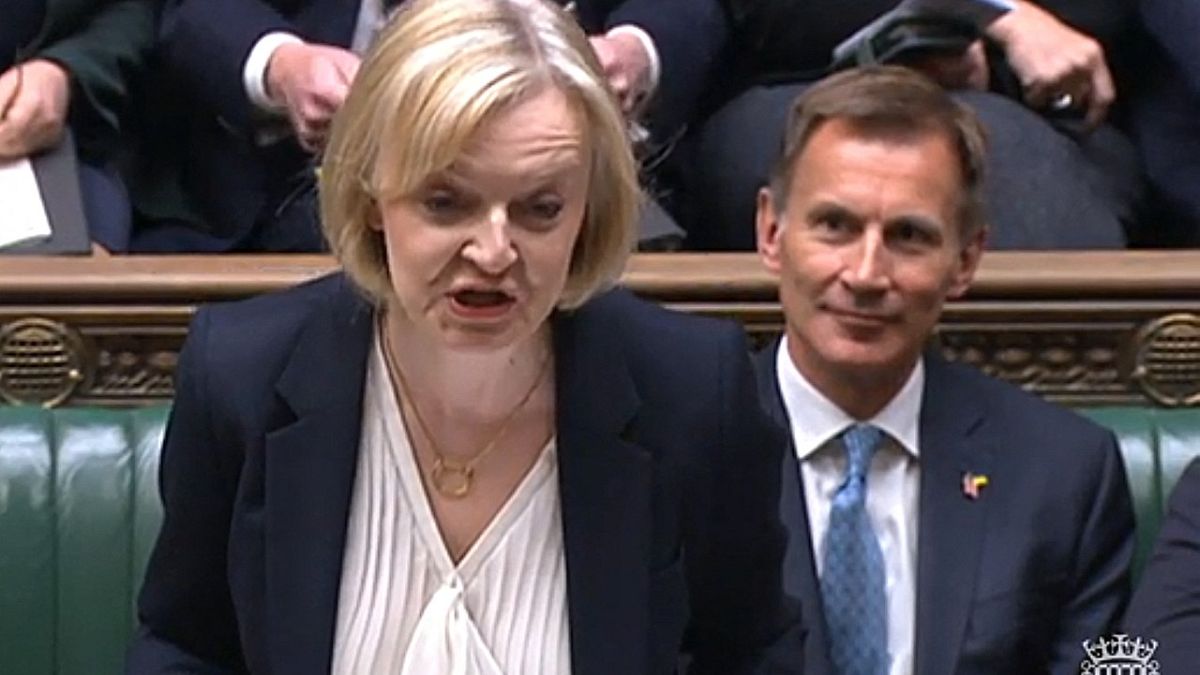Defying calls to quit even though her tax plans have been reversed, the beleagured British leader came under more scrutiny at Prime Minister's Questions.
Liz Truss has insisted she is "a fighter not a quitter" as she appeared at Prime Minister's Questions (PMQs) in parliament for the first time since her budget plan collapsed amid economic and political turmoil.
It came on a day that saw more bad economic news, the UK's annual inflation rate returning to a 40-year high of over 10%, in another illustration of the country's cost-of-living crisis.
In a series of feisty replies to opposition politicians who mocked recent U-turns, the prime minister said she had made it clear that she had made mistakes, but was getting "on with the job" to help the British people.
Labour leader Sir Keir Starmer began with a joke about a book on Truss' time in office, billed as being "out by Christmas". Was this referring to the release date or the title, he asked.
Citing her energy support package, a national insurance commitment and measures to "crack down on militant unions", the prime minister replied that in just under two months in office she had delivered more than Starmer had in two and a half years as party leader.
The Labour leader asked how the prime minister could be held to account when she was "not in charge", referring to her new finance minister's ditching of her economic plan. Spending cuts would now be introduced only because the Conservative government had "trashed the economy", he said.
Starmer finished by listing a series of Truss' policies — as well as her ex-finance minister Kwasi Kwarteng, sacked last week — that were now "gone". "Why is she still here?" he wanted to know.
"I am a fighter not a quitter," the prime minister responded, saying she had acted in the national interest to ensure economic stability.
There were some signs of further confusion on policy however, with Truss giving guarantees about the UK state pension, in apparent contradiction to previous comments by her office and other ministers, including her new finance minister.
Watch PMQs as it happened in the video player above.
Inflation returns to 40-year high
Figures from the Office for National Statistics (ONS) on Wednesday showed the annual rate of consumer price inflation rose to 10.1% in September, from 9.9% in August. It said the main driving force was rising food prices, up by 14.6% on the previous year.
"This government will prioritise help for the most vulnerable while delivering wider economic stability and driving long-term growth that will help everyone," said new finance minister Jeremy Hunt, responding to the figures.
Truss has defied calls for her resignation even though the Chancellor of the Exchequer has ditched virtually her entire budget plans, in a historic policy U-turn to try to stem a dramatic loss of investor confidence.
The prime minister says she will fight on and told her top ministers on Tuesday that she wanted to level with the public that there were tough times ahead.
At Prime Minister's Questions a week ago she told Starmer there would be no public spending cuts — another commitment since thrown out by Jeremy Hunt.
Most Tory members want Truss out — poll
A new YouGov opinion poll showed that even among Conservative Party members who backed Truss for prime minister, more than half of those polled said she should resign. The most popular successor is Boris Johnson, who was forced out of office in July.
Having apologised for the "mistakes that have been made" and that she went "too far and too fast" with her radical tax-cutting plan to boost growth, Truss told party MPs on Tuesday that she was still a low-tax conservative who would pursue such goals more slowly.
Members of parliament have been urged by government to hold off from any move to oust her before it presents its medium-term fiscal plan on October 31.
The "mini-budget" announced by Truss' former finance minister Kwasi Kwarteng — who was sacked last Friday — brought market turmoil, soaring borrowing costs, and a collapse in party support. It outlined plans for extensive, uncosted tax cuts on top of a massive energy support scheme — which his successor says will also be scaled back.
Truss and Kwarteng were accused of ploughing ahead with their plans — with no immediate independent assessment — despite multiple warnings from economists, former Tory ministers and others that tax cuts in the current economic climate could be dangerous.
